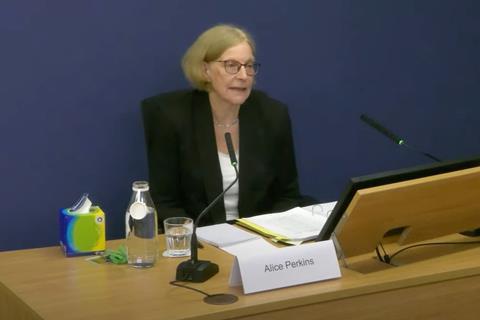Alice Perkins, who was chair of the Post Office board from 2011 to 2015, appears before statutory inquiry
4.05pm: The inquiry discusses the Post Office's reluctance to engage fully with the Criminal Cases Review Commission, which wanted to look into convictions in 2013.
Perkins admits she did not tell the organisation that full cooperation was essential but this was always her position.
Beer asks: 'Do you think you were less welcoming of the scrutiny in 2013 than you like to think looking back?'
Perkins says: 'I didn't express a view at that time... but it was absolutely not my position at any point to be resistant to the CCRC involvement.'
Perkins appears to be struggling with some of her answers now and says she is growing tired. Beer says he will wrap things up for the day and come back fresh tomorrow.
3.55pm: Yet more evidence that lawyers were aware behind the scenes of the issues with Horizon, but never sharing this with the Post Office board.
A paper prepared in 2014 by external firm Bond Dickinson makes reference to the risks to Post Office, noting in particular that problems with the Horizon system had not been disclosed in criminal cases and prosecutions could be undermined.
Perkins reiterates this information never reached the board, adding: ‘I am absolutely sure that if I had known about this then a) I would not have forgotten and b) I would have done something about it.’
3.35pm: More discussions about why not just Crichton but two further general counsels did not share legal advice that called into question the integrity of Horizon prosecutions.
Perkins says: 'I can't understand why, if someone knew advice coming into them, they would not have wanted to show it. As a civil servant over very many years I dealt with lots of difficult things, some really hard to handle. If I got a piece of bad news the first thing I wanted to do was to share it. You would want somebody else's view on it, you want to be open about it. It is beyond me, I don't understand it.'
3.15pm: So why, ultimately, did Crichton appear to hold back key pieces of legal advice from the board that may have prompted a change in policy?
Perkins says: 'I am a believer in the cock-up rather than the conspiracy theory of life. I tend not to think people in large complex organisations are conspirators. I really do not know why [sharing the legal advices] didn't happen. It is extraordinary that it didn't happen. If you read the advice there is no mistaking what it's saying.'
Beer asks: 'Was this done to prevent an emerging scandal from surfacing?'
Perkins replies: 'I wish I knew. I just don't understand it. For a general counsel to receive advice like that, to put it at its lowest, it would in your best interests to show it, wouldn't it?'
The inquiry goes to a break.
3.05pm: Perkins is adamant she did not expect Crichton to compromise her integrity as a lawyer and that the general counsel was 'misinterpreting' what she was asking at the time. She tells the inquiry she wanted Crichton to be on top of details such as the costs and timescale of the Second Sight investigation, not to influence its findings. 'There was a complete failure of communicating between what it was I had in mind and what she interpreted I had in mind,' adds Perkins. 'I am on oath and a truthful person. I am absolutely categorical it was never my intention for anybody in the Post Office to try to influence Second Sight's evidence-based findings.'
Beer says Perkins' own meeting notes 'reveals what you meant'.
Perkins replies: 'It reveals her interpretation of what I meant.'
3pm: The inquiry sees this contemporaneous note written by Perkins following her meeting with Susan Crichton in 2013. She refers to needing someone 'marking' the Second Sight investigation and appears to criticise Crichton for refusing to compromise her integrity as a lawyer to 'influence' key stakeholders. Perkins' own words were that she was 'astonished' by Crichton's position.
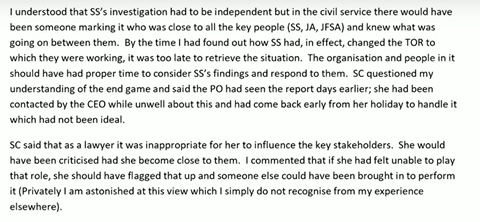
2.50pm: The inquiry hears that the board was given the option of taking a pro-active or reactive approach to sub-postmasters arguing their convictions were wrong. But there was no note in the minutes about whether this was discussed and what decisions were taken. Perkins says this omission is ‘stupid’. The board does not appear to have taken any positive action following the meeting on Horizon convictions.
2.45pm: Beer takes Perkins to her written statement where she effectively blames Susan Crichton for not sharing two pieces of legal advice that revealed the Post Office was shredding minutes and that the expert witness in many prosecutions was unreliable. She writes in her statement: ‘I find it extraordinary and highly regrettable that these pieces of information were not provided to the board (or, that where identified, they were only summarised in an incomplete way). I do not know the reasons for this, but it of course meant that important board scrutiny was avoided. I look back at these omissions and I feel very badly let down.’
Beer said: ‘You sat [Susan Crichton] outside [the board meeting] on a chair and then criticised her failure to reveal information to you as shocking and astonishing.’
Perkins replies: ‘Both pieces of advice came into the Post Office when Susan was the general counsel. It is perfectly true she didn’t have the opportunity to mention that to the board at the meeting. [But] two pieces of advice of that nature shouldn’t just be reported orally, they should have been the subject of some kind of written note – a proper paper saying we have had this advice. The findings of the advice and its implications should have been brought to the board.’
2.35pm: Perkins says she apologised to Crichton later and knows from experience how difficult it is to be shut out of a board meeting. But she stands by her decision because of the nature of the discussions that were being had during the 12 July meeting. Beer points out there are no references to criticisms of Crichton in any of the subsequent board minutes.
2.30pm: As the inquiry has heard before, Crichton (pictured below) was excluded from the board meeting and was left sitting outside for an hour. Beer described her previously as being treated like a 'naughty schoolgirl'.
Perkins explains that non-executive members of the board had met for breakfast and it became clear that there was likely to be strong criticism of Crichton expressed at the main meeting. She says: 'I felt we would not be able to have the discussion we needed to have in the board if [Crichton] was present throughout. I knew there were going to be critical questions raised about the way she handled things.'
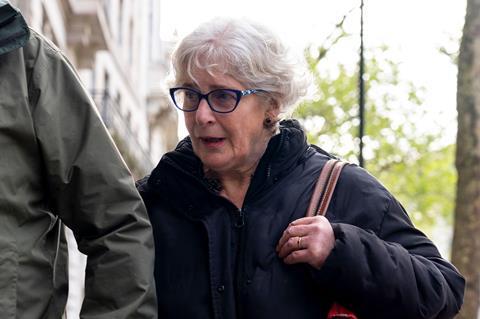
2.15pm: Now onto the crucial board meeting of 12 July 2013, where Susan Crichton prepared a paper in advance and was due to present it to members.
The inquiry sees a section of the paper which said the Post Office was preparing to face civil suits for wrongful conviction, despite the organisation still putting out the message at this point that there was nothing systemically wrong with Horizon and no unsafe convictions. Jason Beer says this ‘doesn’t really add up’.
Perkins says: ‘We were just accepting what we were being told by the general counsel and thought this sounded like the right kind of precautionary action to be taken.’
2.05pm: The inquiry returns, and goes straight to an attendance note taken following a meeting of external Post Office lawyers in July 2010. It was noted that the board wanted to sack Second Sight and that Susan Crichton was going to arrange to meet with them. It went on to say that there was ‘generally an overall defensive air and the board are also feeling bruised’. The lawyers also discussed tensions between Perkins, Crichton and Paula Vennells.
Perkins says she was ‘pretty shocked’ when she saw this note and has ‘absolutely no idea’ what the lawyers based these conclusions on. She flatly denies that the board wanted to sack Second Sight, despite there being reservations about its performance.
1.10pm: Perkins is taken to the section of her witness statement where she said the following: 'I was not at any point trying to bury information that might reveal that there was something wrong with Horizon. If something was wrong, we needed to know, to be open about it and act on it. If the findings were not evidence-based however, it was going to cause serious damage for no reason — and it did not appear that all of Second Sight's criticisms were going to be properly evidenced.'
Beer asks whether this concern over Horizon's credibility was also applied to the prosecutions.
Perkins says: 'Clearly we were aware that people had been prosecuted and so there may be a possibility that prosecutions may be unsafe.'
Beer says that was a 'very abstract statement'.
Perkins says the concerns over Horizon did not overshadow the issue of prosecutions but that she and the board had not appreciated the scale of the convictions. The inquiry breaks for lunch.
12.50pm: And then an email from Paula Vennells to Perkins which recaps a meeting with Susan Crichton. The lawyer was said to be hoping that Second Sight 'should say they have found no evidence of systemic Horizon (computer) issues'.
This was before the publication of the interim report. Second Sight would subsequently say it had found no systemic issues yet and this line was constantly repeated by the Post Office in the years to come whenever Horizon was questioned.
Perkins says there was no pressure being put on Second Sight to state there were no systemic issues.
12.45pm: As the publication of Second Sight's interim report approached in June 2012, there was serious disquiet behind the scenes at the Post Office.
An email from one executive to Vennells warned that 'we need to be very careful not to overplay our hand with SS', and suggested the accountancy firm could be 'quite dangerous' if threatened with legal action or replacement.
Then we see an email from Perkins (see below) where she appears to have said the 'goal' was that no interim report might be published.
Perkins says there was concern in the Post Office that the Second Sight interim report was 'premature' but it was never her intention to stop properly-evidenced findings being reported.
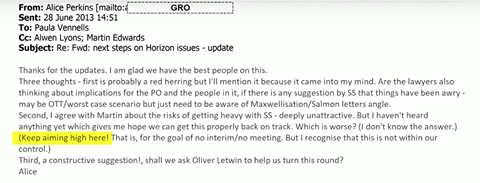
12.25pm: For the final part of the morning session, we start with notes from a meeting with several MPs in 2012. Perkins told this meeting that there was an issue with ‘trying not to put temptation in people’s way’.
She tells the inquiry: ‘It has been suggested that I was inclined to think that sub-postmasters were more likely to be tempted by the fact there was a great deal of cash lying around than any other group of people and that is absolutely not my position. It was not my position then… I was absolutely not thinking or intending to say that I thought sub-postmasters were inherently dishonest or more likely to be dishonest.’
12.10pm: In her witness statement on the scope of the Second Sight investigation, Perkins says that Susan Crichton 'had given thought to the cases in which sub-postmasters had been criminally prosecuted — she thought that we did not want to be seen to reopen these cases, but should position this as a more limited review of the existing evidence, while for those who had not been prosecuted POL should offer a full and independent investigation'.
Perkins believed at the time that all cases raised by MPs should be reviewed, but Crichton did not agree.
The inquiry revisits the now-familiar email in which Crichton was said to have believed that reopening the Seema Misra case was a 'red rag to a bull'. Perkins was described as feeling the business was 'pushing back unnecessarily'. Who was pushing back, asks Beer.
'I thought that Susan Crichton was definitely pushing back unnecessarily,' Perkins tells the inquiry. 'I just wanted these cases to be independently investigated by people who had credibility within the Post Office but also outside. I just wanted to get at the facts.'
The inquiry goes to its second morning break.
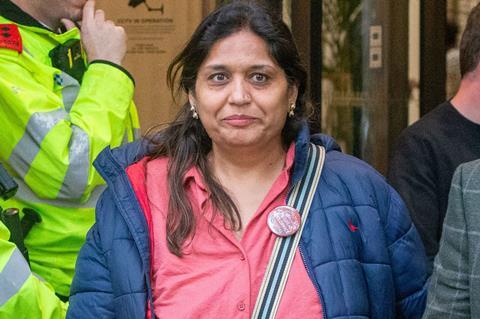
11.55am: Perkins says that general counsel Susan Crichton and the head of IT advised her against appointing forensic accountants Second Sight to conduct an independent review of Horizon. This was on the basis that Horizon had been assessed and cleared already, and there was not time to carry out such work.
11.40am: A moment ago, Perkins said her words had been misrepresented, when board minutes recorded that she wanted to use an independent review to show that Horizon was reliable.
Now it happens again. Executive director Angela van den Bogerd wrote to a colleague in May 2012 stating that Perkins had asked 'to find a way of demonstrating that the Horizon system is robust and not subject to glitches', as claimed by sub-postmasters.
'There has been a misunderstanding here,' she says of the words attributed to her. 'I was prepared to lift the rock and see what was underneath it.'
11.35am: Inquiry is now seeing a series of handwritten notes from what is described as a supper between Perkins and Paula Vennells in March 2012 at the Bistrot Bruno Loubet at London’s Zetter Hotel. Perkins wrote following this meeting that Horizon was robust and that there were no cases where it had been found at fault. Beer points out this became the ‘party line’ deployed for years to come. Was she fed this line by Vennells? ‘It does look like that,’ says Perkins.
11.20am: Back now and looking at the meeting between Arbuthnot and Perkins. Meeting notes record that she told him the Horizon system had been independently reviewed. She now accepts this was not correct. She did not reveal any of her own noted concerns about Horizon or the information supplied by EY. Instead she offered a further independent review to Arbuthnot.
Beer asks if this offer was made to 'convince him and other MPs that the system was not at fault'. Perkins replies: 'Absolutely not.'
With immaculate timing, Beer shows board minutes from March 2012 in which Perkins had said that was exactly the intention. She says she does not know what was in her mind when she told the board that.
11am: Perkins received a briefing note for her meeting with Arbuthnot prepared by Susan Crichton. The general counsel told Perkins that Post Office had 'rigorously tested the Horizon system using independently assured processes and it has been found to be robust'.
Perkins admits she did not take any action to query this, despite having been told by her own auditors that Horizon data may be unreliable.
She tells the inquiry: 'I think that I was more reassured than I should have been and I can see looking back at this that I should have asked more questions.'
The inquiry goes to a break.
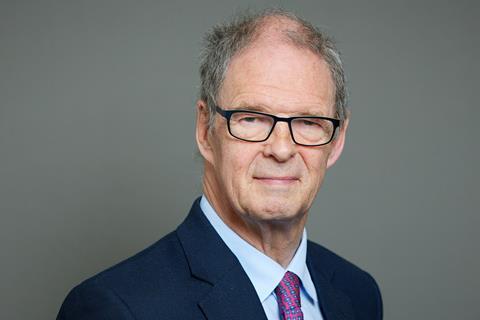
10.50am: The inquiry sees this email (below) to Perkins from James Arbuthnot MP, who told her he was 'deeply sceptical' about the reliability of Horizon and asking for a reconsideration of the Post Office position.
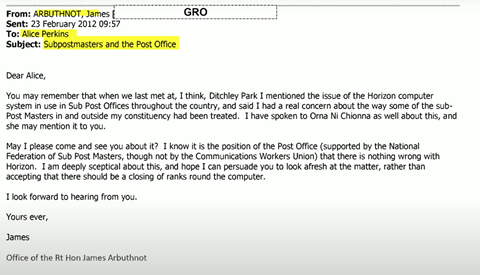
10.45am: Perkins says she is ‘mystified’ that general counsel Susan Crichton was looking at whether internal reports could be given privileged status. Audit and risk management reports produced in 2012 were all labelled ‘legally privileged and strictly confidential’.
The inquiry sees one review of Horizon from March 2012 on which is a handwritten note from Perkins asking: ‘Which parts of this are relevant to the sub-postmasters issues?’
She cannot now remember who she asked this question to. She says that now she would ‘absolutely want to nail it down’ what reports were being made and how they related to prosecutions.
10.30am: Two days after the Ernst & Young meeting, the chair of Royal Mail Group Donald Bryden emailed chief executive Paula Vennells and CC-ed Perkins. He wanted to know whether an independent assessment had been carried out of Horizon. Perkins did not mention at the time that she had been briefed recently that Horizon may be unreliable. Instead, Vennells replied that ‘this has reared its head before’ and that each time any cases have gone to court, the Post Office’s position has been upheld. Again, Perkins said nothing about the auditor's concerns and she tells the inquiry she does not remember why now.
Beer asks: 'Is that what happened consistently in your time that if somebody from the Post Office gave you reassurance you gladly accepted their reassurance?'
'Absolutely not,' she replies.
10.25am: Beer is pressing Perkins on why she did not make the link between the auditors saying Horizon was a risk and that prosecutions had been secured based on Horizon data. Perkins responds: 'I am a human being and I didn't see it.'
Perkins admits she had not read the Private Eye or Computer Weekly articles which made the same points that the auditors were making about Horizon and reiterates that she just 'didn't know'.
She adds: '[The auditor's report] is the first time that anybody had made the suggestion to me and I simply did not weigh this in the way that of course everybody now, with the benefit of hindsight and looking back at this, would weigh it.'
10.15am: Perkins is shown notes from her meeting - one of her first upon joining the Post Office - with someone from auditors Ernst & Young in 2011 who told her there was something wrong with the Horizon IT computer system. Specifically in relation to data accuracy. Perkins did not discuss this with her board and does not appear to have taken any action in response. She did not ask at any point in her time why nobody in the Post Office told her about this.
'I'd been in the role a few weeks, I was absorbing a great deal of information, but I don't think I took that on then,' she tells the inquiry. 'This didn't ring the kind of alarm bell to me that it obviously rang thinking it now.'
10.05am: Inquiry counsel Jason Beer KC has begun by focusing on Perkins' involvement with the IT side. She admits there was no-one on her board with IT expertise and says she was 'not familiar with the language'. Beer asks whether this was an IT scandal or something wider. Perkins accepts it is about more than Horizon. She says two or three people raised the Horizon issues in the first few months of her time at the Post Office but she did not understand the scale or complexity of what was happening.
9.55am: We had been expecting to hear from two lawyers earlier in the week, by the way. Current general counsel Ben Foat was due to appear on Monday but his evidence was postponed due to the illness of a member of the inquiry legal team.
Foat's predecessor, Jane MacLeod, has spent the week being doorstepped at her Australia home after she refused to give oral evidence to the inquiry this week. This despite the inquiry offering to pay her travel and accommodation, or let her appear through a video link. MacLeod's written evidence, which will not be tested, is summarised here: Post Office fought litigation 'to resolve key questions', says refusenik ex-general counsel Jane MacLeod
9.50am: Alice Perkins begins with a pre-prepared statement where she offers an apology to sub-postmasters, several of whom are in the public gallery today. She admits that ‘lives were wrecked’ by what happened and regrets that she was not able to get to the bottom of the scandal. Perkins’ evidence will be crucial on several issues, not least the decision to exclude general counsel Susan Crichton from a board meeting in July 2012 where the lawyer had been due to report on the Horizon system. Chief executive Paula Vennells, who presented the paper instead, told the inquiry that Perkins had made the decision to exclude Crichton. The inquiry will want to know why.
